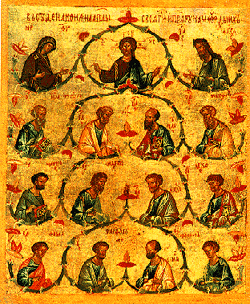The Twelve
Apostles
 By
the term Twelve Apostles only the twelve disciples of Christ
should be understood. There are four lists of their names in
the New Testament: Matthew 10:12, Mark 3:18, Luke 6:14, and
Acts of the Apostles 1:13. The list of names is as follows:
Simon also called Peter and Andrew his brother; James and
John, the sons of Zebedee; Philip and Bartholomew; Thomas
and Matthew, the tax collector; James the son of Alphaeus
and Thaddaeus: Simon the Cananaean, and Judas Iscariot
betrayed the Lord. The lists do not agree with each other as
to the sequence of names, agreeing only in listing Peter
first even though it was Andrew, his brother, who was called
first by the Lord.
By
the term Twelve Apostles only the twelve disciples of Christ
should be understood. There are four lists of their names in
the New Testament: Matthew 10:12, Mark 3:18, Luke 6:14, and
Acts of the Apostles 1:13. The list of names is as follows:
Simon also called Peter and Andrew his brother; James and
John, the sons of Zebedee; Philip and Bartholomew; Thomas
and Matthew, the tax collector; James the son of Alphaeus
and Thaddaeus: Simon the Cananaean, and Judas Iscariot
betrayed the Lord. The lists do not agree with each other as
to the sequence of names, agreeing only in listing Peter
first even though it was Andrew, his brother, who was called
first by the Lord.
It is believed that Christ selected only twelve which was the number of the twelve sons of Jacob, who later became the leaders of the twelve tribes of Israel. After the Pentecost Christ's twelve disciples became the leaders of the new Israel. The number twelve was considered so important that very shortly after the falling of Judas Iscariot the remaining eleven voted in a new Apostle by the name Matthias. There are three from among the twelve (Peter James, John) who constituted the inner circle around Christ and were selected to witness extraordinary events in the life of Christ, such as His Transfiguration and His agonising prayer at Gethsemane. It should be noted that besides the Twelve, Christ selected another seventy from among the multitudes that followed him. Their main mission was to precede Christ in visiting towns and make the necessary preparations for His visits.
The basic qualifications of the Twelve Apostles by which the Church distinguished them from among other preachers of the Gospel include the following: the fact that it is these whom Christ called to follow Him and they did follow Him during His entire life and work on earth until the day of His Ascension; and after the coming down on them of the Holy Spirit on the day of the Pentecost, they witnessed in public and to the entire world the Resurrection. of Christ and the new faith in Him; the status of apostolicity demanded that one should have been an eyewitness to the Lord's sayings and deeds and a follower of Him throughout His earthly sojourn so that his witness and evidence about the Lord would be supported on his own personal experience. According to the Acts of the Apostles 4:20, it was only the Apostles who were entitled to state as they did, "for we cannot but speak of what we have seen and heard". And when the Apostles voted in Matthias to take the place of Judas, they ejected one who had the qualification of having eyewitnessed and followed the Lord.
The Apostles were called by Christ to continue His work of redeeming men from sin by faith in the true God and by thus establishing the kingdom of God on earth. Christ Himself shortly before His Ascension commanded them to go and make disciples of all nations, baptising them "in the name of the Father; and of the Son, and of the Holy Spirit" and teaching them to observe all that He had commanded them; and He promised to be with them always.